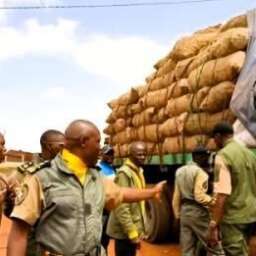I. Historical and political background
The Genesis of the Anglophone Crisis
The birth of the Anglophone crisis in Cameroon is rooted in the country’s colonial history. Following the defeat of Germany in World War I, Cameroon was divided between Britain and France under the League of Nations mandate. When the British zone was then given a plebiscite in 1961, they voted for reunification with La République du Cameroun rather than Nigeria. The Anglophones were increasingly marginalized from national issues, and frustration accumulated, as did demands for autonomy. By 2016, these grievances boiled over as Anglophone lawyers and teachers protested against the dispatch of French-speaking judges and teachers into their courts and schools, respectively. What had begun as a struggle for federalism soon disintegrated into demands for sheer independence. By 2017, separatist leaders had proclaimed the creation of a breakaway state, Ambazonia, in the Northwest and Southwest regions of Cameroon. The response of the state has been marked by repression, with over 6,000 deaths, large-scale displacement, and extensive documentation of atrocities by both state security forces and armed separatists. The conflict has separated many families.
The evolution of authoritarian rule and the electoral landscape
Cameroon’s political ecosystem is headed by President Paul Biya, who has been president since 1982, making him one of the longest-serving African leaders. Biya has gradually removed the checks on executive power over the years, most notably amending the constitution in 2008 and removing the term limits. His Cameroon People’s Democratic Movement (CPDM) controls almost every aspect of governance, from the judiciary to the military and even the electoral commission, ELECAM. Both the international community and local stakeholders have criticised elections in Cameroon for their lack of transparency, suppression of opposition, and facilitation of Biya’s entrenchment through gerrymandering, voter intimidation, and administrative bias.
The electoral framework in Cameroon is deeply flawed. Although ELECAM has introduced some modern tools, such as biometric voter registration, it lacks independence and is seen as an appendage of the ruling party. This has bred broad indifference and suspicion across the population, especially among Anglophone populations. The 2018 presidential elections, which saw Maurice Kamto stand as Biya’s main challenger, were highly disputed. Kamto’s arrest and crackdown on his followers afterward merely reinforced suspicions that elections are more applied to legitimize the regime rather than open up channels for change. As the 2025 polls draw near, these simmering tensions are still unresolved, and it has serious implications regarding whether the elections can spur peace.
The 2025 Presidential Elections: A politicized battlefield
The 2025 presidential election, scheduled for October, is likely to be a turning point in the post-colonial history of Cameroon. The 2025 elections in Cameroon have come with high electoral momentum, especially among voters, with new candidates and a special focus on the two former ministers who resigned and joined the race: Issa Tchiroma and Bello Bouba. The two, who for decades had pledged their allegiance to Biya and the CPDM party, have added to the list of challengers of the current regime. They, amongst others, considered the main challengers of the incumbent regime after the disqualification of Maurice Kamto. Voters are hoping that the two can put up a strong front against the incumbent. While two out of the three Anglophone presidential candidates, Akere Muna and Ateki Seta, have dropped out of the race and pledged their support for Bouba, this has left Cameroonians with mixed feelings, as some applaud the move and others disregard it. The country is hence approaching this election milestone with a sense of foreboding rather than enthusiasm.
Efforts by ELECAM to improve transparency—including partnerships with the United Nations and the deployment of biometric kits—have been cautiously welcomed. Yet, many analysts and civil society activists share the perception that technical reforms alone will be insufficient to correct the very root structural problems. Electoral integrity can never be ensured in a setting where freedom of expression is constricted, opposition leaders are perennially harassed, and security agents operate with impunity. The election’s capacity to usher peace is therefore inextricably tied up with the broader political will to reform the system, not just the act of voting.
II. Navigating Elections amidst an Active Conflict
Voter disenfranchisement in the Anglophone regions
Conducting elections in conflict regions presents insurmountable challenges. In Cameroon’s Anglophone regions, armed separatist groups declared before the 2018 presidential elections that no elections would be allowed in what they consider occupied territory, while other stakeholders called for dialogue. In previous elections, combatants have kidnapped, tortured, and killed people attempting to vote. Polling centers and schools have been set ablaze, and local government officials have been attacked, causing so much fear in the people. Displacement, fear, and the breakdown of local government institutions constrain the mobilization of voters. This then undermines not just democratic values, but also the national government’s legitimacy. It bolsters the separatist premise that Anglophones are not part of the Cameroonian body politic and must seek self-determination through some other means. Until inclusive dialogue takes place, the election risks making those cleavages deeper. Non-violent Anglophones are feeling excluded from a political process that does not legitimize their particular identity and grievance. The 2025 election will replicate these forces if action is not taken to establish trust in the voting process.
Civil liberties and political repression
Cameroon is one of Africa’s most restrictive political spaces. CSOs, journalists, and opposition figures face harassment, detention, and censorship. The government frequently uses national security and anti-terrorism laws to justify the arrest of critics and activists, including Anglophone leaders and peaceful demonstrators. For example, Maurice Kamto was detained for nine months following his claims of electoral fraud in 2018. His supporters and several journalists covering opposition rallies were targeted, with reports of torture by security forces.
The strong control over state media, with the opposition being given minimal airtime and ordinarily portrayed as agents of destabilization, As well as internet blackouts and social media shutdowns are normal during times of heightened political sensitivity in Cameroon. The measures instil a culture of fear and desperation under which elections are less democratic and more of a rubber-stamping of the status quo. The case is worse in the Anglophone regions, where military tribunals have been alternatives to civilian courts, and arbitrary detention and arrest are the order of the day. NGOs such as the Centre for Human Rights and Democracy in Africa, Amnesty International, and Human Rights Watch have documented numerous human rights violations and intensified advocacy for international pressure.
The role of regional and international actors
International actors are increasingly taking a greater interest in Cameroon’s political crisis. France, its long-time closest ally, has been criticized for its silence on the situation in Cameroon, its former colony. However, new players like Russia are making inroads. In 2022, Cameroon entered into a security cooperation agreement with Russia, which caused Western countries to fret about the emerging potential for realignment of alliances. The United Nations has played a limited but symbolically important role. Recently, it facilitated technical cooperation with ELECAM and supported humanitarian initiatives in conflict-affected areas. There are also growing calls within the UN and African Union to advocate for a political solution, including the appointment of a Vice President to prepare for an eventual transition of power. These gestures are encouraging, yet not sufficient to guarantee peace in the warring regions. The international community must move beyond technical support and engage more in supporting dialogue and institutional reform. Without such engagement, the election could become another lost opportunity for conflict resolution.
III. Aftermath and Possible Scenarios: Peace or a Perpetuated Stalemate?
Potential for a Path to Peace
Despite the pessimistic scenario, there is hope for peace if only certain conditions are met. The government must first acknowledge the legitimacy of Anglophone grievances and seize the moment for genuine negotiations. This may include the re-establishment of federal structures, local self-government, or special status with powers of substance, not gestures of tokenism. The 2019 Grand National Dialogue was an attempt in this direction, but came under heavy criticism for being top-down and unrepresentative. A new and more inclusive process is needed for an effective dialogue that would bring lasting peace.
Secondly, electoral reform must look beyond biometric kits and include a truly autonomous electoral commission, balanced access to the media, and legislative protection for opposition parties. Free and fair elections in the Anglophone regions would be a confidence-building measure. Widespread deployment of international observers and their follow-up recommendations being implemented in good faith would be required. If seriously taken, these actions could allow the 2025 elections to mark a new beginning in Cameroon’s history—based on accountability, decentralization, and reconciliation.
Furthermore, a strong opposition coalition can be a path worth restoring peace. The current regime has experienced the crisis for nine years and has been unable to resolve it. It is time for opposition candidates to harmonise themselves and put forth a strong front with one candidate to challenge the regime. In this case, the victory of the opposition would introduce new and innovative approaches to resolving the conflict.
Separatist fighters must retrain from all form of violations against civilians and should allow citizens of these regions to exercise their civic right to vote. Their call for election boycott indirectly enhances the victory of the current regime as evident in the 2018 presidential election where the incumbent got a landslide victory.
Risks of escalation and entrenchment
However, if the election is conducted in the current climate of repression, it will fuel the tensions. A controversial result can trigger mass protests in Francophone cities and worsen hostilities in the Anglophone regions. Since Biya is aged and in alleged poor health, the issue of succession is at stake, especially given a prediction of the possibility of Cameroon falling into a polycrisis. Failure to prepare for political transition could plunge the country further into turmoil, especially if top elites begin to vie for dominance.
Moreover, the continuation of military operations in Anglophone regions without parallel political engagement could provoke even more radicalization. Separatist groups have shown remarkable resilience and adaptability. As long as they can exploit the government’s weakness and popular grievances, they are unlikely to disappear. The risk is that Cameroon becomes stuck in a protracted low-intensity conflict with periodic flare-ups that continue to destroy lives and livelihoods.
Socio-economic implications
The broader consequences of continued instability are devastating. Cameroon’s economy, though showing modest growth projections (around 4.2% for 2025), remains fragile. The conflict has severely impacted agriculture, education, and health services in the Northwest and Southwest regions. Youth unemployment remains high, and many educated professionals are increasingly migrating out of the country. Investors are increasingly wary, especially with regional security concerns like Boko Haram still active in the Far North. Peace is, therefore, not just a political but also an economic imperative. Stability would unlock foreign investment, improve human development indicators, and revive confidence in public institutions. Conversely, preservation of the status quo will deepen poverty, fuel migration, and risk destabilizing the broader Central African sub-region.
Conclusion

Enowbachem Agbortanyi
Enowbachem Agbortanyi is a Policy Analyst with the Peace and Security Division at the Nkafu Policy Institute. He holds a Master’s in Political Science from the University of Gothenburg and is a Swedish Institute Alumnus. His work spans roles at Centre for Human Rights and Democracy in Africa (CHRDA), and research contributions to the Varieties of Democracy Institute (V-Dem) and the Governance and Local Development Institute (GLD) both in Sweden.


































